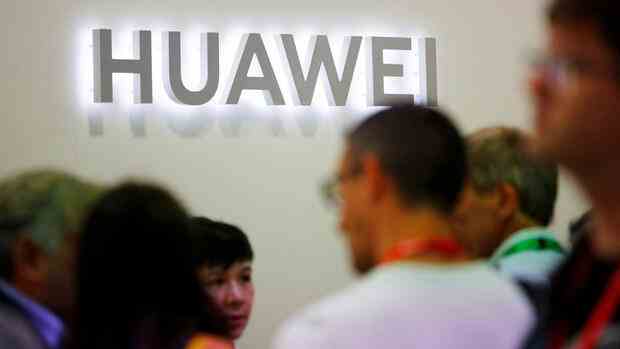Berlin The Vice President of the Federal Office for the Protection of the Constitution, Sinan Selen, has expressed concern about the connections of Deutsche Telekom and Deutsche Bahn (DB) to the Chinese tech provider Huawei. “Of course we have a problem there, a feeling of disturbance,” said Selen on Thursday at the sidelines of an event on espionage, sabotage and cyber risks for the German economy in Berlin. “I always find it difficult when you consciously become dependent on individual companies that you know are affiliated with and integrated by the state.”
Politicians see it as an attempt to circumvent US sanctions. The criticism of it is fierce – also in the USA. Telekom rejects the allegations. “This assumption has no factual basis,” said a company spokesman.
Equally critical is the fact that Deutsche Bahn relies on Huawei components for its digital infrastructure. Federal Economics Minister Robert Habeck (Greens) had also expressed reservations about the network supplier. The background is the concern of too great a technological dependence on China. There are also warnings of espionage opportunities through Chinese components, which Huawei rejects.
The security authorities see things differently – especially when it comes to critical infrastructure such as the German mobile network or rail traffic. His authority pointed out the problem “at various points”, said constitutional protection officer Selen. “And I can only wish that it gets a lot more attention.”
The Office for the Protection of the Constitution fears scenarios “that can cause us problems”
Although it was “a bit too early” for an assessment, Selen added with a view to Telekom and the railways. However, as in the case of Huawei, we are talking about companies “that are very heavily influenced by the state and accordingly a state agenda also influences appropriate action”. Selen fears scenarios “that can cause us problems”. He left open what he meant by that. Selen simply said he didn’t think everyone was aware of this dimension.
>> Read here: Is the federal government making a mistake with its ban on China?
Albrecht von der Hagen, general manager of the family business association, sees it that way too. “It can’t be true that German state-owned companies act completely contrary to what German politics demands from the private sector,” von der Hagen told the Handelsblatt.
The federal government warns the private sector against dependencies on China, advises international diversification and demands the highest security standards when installing Huawei products in critical infrastructure. “And at the same time, Deutsche Telekom, one third of which is state-owned, is secretly collaborating with Huawei.” That was “an unbelievable disregard for state control requirements,” von der Hagen criticized.
Deutsche Bahn also “continues to buy Chinese digital goods without any security reservations in order to digitize the German rail network,” von der Hagen said. “Here, state-owned companies get caught up in the dependency of companies that have to comply with the guidelines of a state that violates human rights.”
The association’s general manager warned of possible cost risks. “In the event of a possibly necessary dismantling of the critical components, not a single euro of taxpayer aid should flow to these ignorant state-owned companies against any warning from the state,” said von der Hagen. “Otherwise, German politics would make a fool of itself at the expense of the taxpayer.”
Huawei components are already banned in some western states
Huawei is already blacklisted in some countries because of its proximity to the Chinese government. Security authorities fear that information about components from the network supplier could flow to China or that sabotage could be perpetrated.
So far there is no publicly available evidence of this. Huawei and the government in Beijing have always denied the allegations.
Nevertheless, the federal government is examining the components for modern mobile networks according to the 5G standard from Huawei and its Chinese competitor ZTE more closely for security risks. At the end of the day, telecom providers could be forced to remove components that have already been installed. In some other western states these are already banned.
However, the federal government is striving to extend the standard that is currently being used for the strict 5G test to other parts of the critical infrastructure. Because it is becoming increasingly obvious that not only the mobile network could be a weak point.
Whether Deutsche Bahn, banks, energy companies or hospitals: they all have their own communication systems in which sensitive hardware is installed and software is used. And there, as with the railways, there is also a debate as to whether the use of Chinese technology increases the risk of manipulation.
This is not limited to Germany either: the Australian government, for example, wants to have cameras, intercoms or electronic access systems made in China replaced in government buildings because it is afraid of espionage.
More: Telecom industry complains about possible Huawei ban

